A Thousand Times Good Night
What happens when a war photographer gives up her passion for the sake of her family?
Overview
Sacrifice, of the kind where ideals clash with safety and responsibility, is at the heart of A Thousand Times Good Night. The film starts with a potent example, as photojournalist Rebecca (Juliette Binoche) snaps away in Afghanistan. Secreted to a secluded spot, she starts capturing a funeral; however, it is soon revealed that her subject isn’t dead. Instead, the prone pose is part of a ritual preparing a suicide-bomber for a mission that goes awry, injuring Rebecca in the process.
Juxtaposing the struggle of a woman driven to chronicle the horrors of humanity with the plights of those whose daily lives exist on the precipice between life and death, this introduction makes a strong statement. The former clearly seems trivial in comparison to the latter, but both have costs and consequences. Rebecca has a husband (Nikolaj Coster-Waldau) and two daughters (Lauryn Canny and Adrianna Cramer Curtis) restless with worry when she is out in the field. Giving up her passion for her loved ones’ peace of mind doesn’t come easily, as she is troubled in her attempts to reconcile the need to make a difference with the comforts of home and the calling of family.
Alas, following on from such a striking and tense opening was always going to be difficult. The focus swiftly shifts to an account of disturbed domesticity, and so does the A Thousand Times Good Night’s effectiveness and interest. Contemplating the professional versus personal divide is admirable, and touching upon the ethics of observing versus intervening sparks questions, although both areas have been traversed more thoughtfully in other films. Here, they’re just mechanisms to incite conflict in a marriage melodrama.
In such rendering of the circumstances, much is left to rest on Binoche’s talented shoulders. Thankfully, it is never tiresome to see the actress on screen, even when a furrowed brow seems her standard expression. Coster-Waldau is sadly given little to do, other than rally against the protagonist’s choices. Instead, it is young newcomer Canny that offers the best depiction of the traumatic repercussions of living with and loving someone constantly drawn to perilous situations.
A Thousand Times Good Night is inspired by the early photographer years of director Erik Poppe’s own career, as conveyed in a script co-written with his long-term collaborator Harald Rosenløw-Eeg, but it is easy to dismiss its content as fiction. Only the war-torn visuals seem taken from Poppe’s experiences; indeed, some of his own stills are used, and the handsome imagery certainly eclipses the strived-for emotion. That’s the issue: the story and performances are just too concerned with heavy-handed sentiments to ring true. It seems that the key sacrifice the film makes is in its approach, preferring the appearance of resonance to taking any thematic risks.





